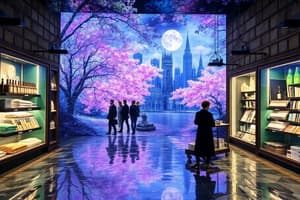Podcast
Questions and Answers
What is one of the technical characteristics of virtual reality?
What is one of the technical characteristics of virtual reality?
- Simplicity
- Immersion (correct)
- Limited interaction
- Static display
Which technology is NOT part of the broader scope of virtual reality?
Which technology is NOT part of the broader scope of virtual reality?
- Computer graphics
- Television broadcasting (correct)
- Simulation technology
- Sensing technology
Who first presented the concept of making a virtual world appear realistic?
Who first presented the concept of making a virtual world appear realistic?
- Ivan Sutherland (correct)
- Steve Jobs
- Elon Musk
- Mark Zuckerberg
What does interactivity in virtual reality offer to the user?
What does interactivity in virtual reality offer to the user?
What is the triangle of virtual reality technology comprised of?
What is the triangle of virtual reality technology comprised of?
Which of the following is a primary focus of virtual reality applications?
Which of the following is a primary focus of virtual reality applications?
Which component is generally NOT considered a classic component of a VR system?
Which component is generally NOT considered a classic component of a VR system?
What allows virtual reality users to obtain insights about their next actions?
What allows virtual reality users to obtain insights about their next actions?
What is the predicted compound annual growth rate of the global virtual reality market from 2022 to 2030?
What is the predicted compound annual growth rate of the global virtual reality market from 2022 to 2030?
Which term describes the illusion of being part of a virtual environment?
Which term describes the illusion of being part of a virtual environment?
What does telepresence specifically simulate?
What does telepresence specifically simulate?
What distinguishes a virtual environment (VE) from virtual reality (VR)?
What distinguishes a virtual environment (VE) from virtual reality (VR)?
How is immersion often subcategorized?
How is immersion often subcategorized?
Which of these fields is NOT mentioned as an application of virtual reality?
Which of these fields is NOT mentioned as an application of virtual reality?
What is cyberspace primarily associated with today?
What is cyberspace primarily associated with today?
What provides the operator a feeling of actual presence at the worksite in telepresence?
What provides the operator a feeling of actual presence at the worksite in telepresence?
What health issue has been a primary concern with extended use of immersive technologies?
What health issue has been a primary concern with extended use of immersive technologies?
Which industry is NOT mentioned as an application area for immersive technologies?
Which industry is NOT mentioned as an application area for immersive technologies?
What is one way immersive technologies are being integrated to enhance user experiences?
What is one way immersive technologies are being integrated to enhance user experiences?
What aspect of immersive technologies is emphasized regarding user accessibility?
What aspect of immersive technologies is emphasized regarding user accessibility?
What trend is likely to influence the future of human experience according to the content?
What trend is likely to influence the future of human experience according to the content?
Which term refers to virtual replicas of physical objects or systems anticipated to become more sophisticated?
Which term refers to virtual replicas of physical objects or systems anticipated to become more sophisticated?
What type of virtual environments have emerged for social interactions, as stated in the content?
What type of virtual environments have emerged for social interactions, as stated in the content?
What is a significant consideration that has arisen with the advancement of immersive technologies?
What is a significant consideration that has arisen with the advancement of immersive technologies?
What is a primary advantage of using gestures as input in VR systems?
What is a primary advantage of using gestures as input in VR systems?
What technology is projected to significantly grow in market size from 2021 to 2024?
What technology is projected to significantly grow in market size from 2021 to 2024?
Why are gloves considered more consistent than camera-based input systems in VR?
Why are gloves considered more consistent than camera-based input systems in VR?
Which of the following is NOT mentioned as an application of VR technology?
Which of the following is NOT mentioned as an application of VR technology?
What is a drawback of using gestures in VR technology?
What is a drawback of using gestures in VR technology?
How does VR technology benefit product design processes?
How does VR technology benefit product design processes?
What type of technology can help practice protocol actions in emergencies through VR?
What type of technology can help practice protocol actions in emergencies through VR?
Which characteristic of VR input devices helps avoid false positives during human communication?
Which characteristic of VR input devices helps avoid false positives during human communication?
What has been responsible for making Virtual Reality and Augmented Reality experiences more realistic and comfortable?
What has been responsible for making Virtual Reality and Augmented Reality experiences more realistic and comfortable?
What is a key advantage of standalone VR headsets?
What is a key advantage of standalone VR headsets?
What challenge has hindered the widespread adoption of AR smart glasses?
What challenge has hindered the widespread adoption of AR smart glasses?
What differentiates Mixed Reality (MR) from other immersive technologies?
What differentiates Mixed Reality (MR) from other immersive technologies?
Which trend improves user mobility in VR and AR technologies?
Which trend improves user mobility in VR and AR technologies?
What has improved to help developers create immersive VR and AR experiences more easily?
What has improved to help developers create immersive VR and AR experiences more easily?
As of 2021, what was a significant trend in the display technology used for immersive experiences?
As of 2021, what was a significant trend in the display technology used for immersive experiences?
What is a characteristic of the development trend in consumer devices for VR and AR?
What is a characteristic of the development trend in consumer devices for VR and AR?
What is one potential outcome of the digital realm mentioned in the content?
What is one potential outcome of the digital realm mentioned in the content?
Which technologies are highlighted as pivotal in shaping future human experiences?
Which technologies are highlighted as pivotal in shaping future human experiences?
What is emphasized as necessary when adopting new technologies?
What is emphasized as necessary when adopting new technologies?
What key aspect must be balanced as we advance technologically?
What key aspect must be balanced as we advance technologically?
What does the content suggest about cybersecurity in the context of technological advancements?
What does the content suggest about cybersecurity in the context of technological advancements?
What does the integration of digital and physical realms through XR require?
What does the integration of digital and physical realms through XR require?
Which area is NOT mentioned as an aspect of the technological landscape in the content?
Which area is NOT mentioned as an aspect of the technological landscape in the content?
What do discussions and collaborations aim to achieve regarding emerging technologies?
What do discussions and collaborations aim to achieve regarding emerging technologies?
Flashcards
Virtual Reality (VR)
Virtual Reality (VR)
An immersive technology that simulates a real-world environment, providing a realistic and interactive experience through multiple sensory channels.
Immersion in VR
Immersion in VR
The sense of being fully immersed in the virtual environment, encompassing visual, auditory, and tactile sensations.
Interactivity in VR
Interactivity in VR
The ability for users to interact with the virtual environment in a natural and realistic way.
Imagination in VR
Imagination in VR
Signup and view all the flashcards
Augmented Reality (AR)
Augmented Reality (AR)
Signup and view all the flashcards
Mixed Reality (MR)
Mixed Reality (MR)
Signup and view all the flashcards
Extended Reality (XR)
Extended Reality (XR)
Signup and view all the flashcards
The Triangle of Virtual Reality Technology
The Triangle of Virtual Reality Technology
Signup and view all the flashcards
Early Commercial VR Systems
Early Commercial VR Systems
Signup and view all the flashcards
Gestures in VR
Gestures in VR
Signup and view all the flashcards
Gesture Advantages
Gesture Advantages
Signup and view all the flashcards
Gesture Disadvantages
Gesture Disadvantages
Signup and view all the flashcards
Gloved VR Systems
Gloved VR Systems
Signup and view all the flashcards
Push-to-Gesture Systems
Push-to-Gesture Systems
Signup and view all the flashcards
VR in Design
VR in Design
Signup and view all the flashcards
VR Training
VR Training
Signup and view all the flashcards
Virtual Environment (VE)
Virtual Environment (VE)
Signup and view all the flashcards
Presence in VR
Presence in VR
Signup and view all the flashcards
Telepresence
Telepresence
Signup and view all the flashcards
Cyberspace
Cyberspace
Signup and view all the flashcards
Compound Annual Growth Rate (CAGR) of VR
Compound Annual Growth Rate (CAGR) of VR
Signup and view all the flashcards
Virtual World
Virtual World
Signup and view all the flashcards
Advancements in Display Technology
Advancements in Display Technology
Signup and view all the flashcards
Wireless VR/AR
Wireless VR/AR
Signup and view all the flashcards
Standalone VR Headsets
Standalone VR Headsets
Signup and view all the flashcards
AR Smart Glasses
AR Smart Glasses
Signup and view all the flashcards
Content Creation Tools
Content Creation Tools
Signup and view all the flashcards
Future of human experience
Future of human experience
Signup and view all the flashcards
Immersive technologies & their impact
Immersive technologies & their impact
Signup and view all the flashcards
Digital twins
Digital twins
Signup and view all the flashcards
Mirror worlds
Mirror worlds
Signup and view all the flashcards
Ethical considerations in immersive technologies
Ethical considerations in immersive technologies
Signup and view all the flashcards
Immersive technologies & innovation
Immersive technologies & innovation
Signup and view all the flashcards
Integration of immersive technologies with AI & IoT
Integration of immersive technologies with AI & IoT
Signup and view all the flashcards
Accessibility in immersive technologies
Accessibility in immersive technologies
Signup and view all the flashcards
Study Notes
Introduction to Immersive Technologies
- Immersive technologies encompass technologies like VR, AR, MR, and XR
- Virtual Reality (VR) is a high-end user-computer interface that uses real-time simulation and interaction through multiple sensory channels (vision, sound, touch, smell, taste)
- VR is not augmented reality
- Virtual Reality technology is an important direction of simulation technology. It incorporates simulation, computer graphics, human-machine interface, multimedia, sensing, network technologies. VR includes simulation environment, perception, natural skills, and sensing equipment
- VR has three technical characteristics: immersion, interaction, and imagination
- These three characteristics are interconnected
- VR technology immerses users in the virtual world, including visual, auditory, and tactile immersion
- Interactivity provides naturalness and real-time, crucial for social functions
- VR enables users to imagine next behaviors and states of the system via judgment, reasoning, and associations based on virtual world experiences
Brief History of Virtual Reality
- Ivan Sutherland presented the concept of virtual reality in 1965
- Sensorama, a multi-sensory simulator (1957), was the initial approach to creating a virtual reality experience. It was patented in 1962
- The Sensorama machine included a prerecorded film in color and stereo, along with binaural sound, scent, wind, and vibration
- Ivan Sutherland's work on the "Ultimate Display" laid out the concept of an artificial world with interactive graphics, force feedback, sound, smell, and taste
- Early commercial VR systems used gloves or gestures for input
- The systems faced challenges with limited degrees of freedom, difficulty with recognition, precision, and line-of-sight problems
- Early VR systems used gloves and gestures, but difficulties arose with lack of recognition rates and issues with push-to-gesture systems
VR Becomes an Industry
- VR enables an open environment for design, where product quality matches rendered models from concept to detail design.
- This is crucial in industries with error-prone processes
- The industry is growing fast, with the global VR market projected to reach over $12 Billion by 2024.
- Virtual training using VR enables operators to practice protocols and procedures for emergencies in industrial settings
- Immersive experiences and realistic simulations are used in various sectors, including automotive, healthcare, retail, tourism, real estate, architecture, interior design, and gaming.
VR, AR, MR, XR: Similarities and Differences
- Augmented Reality (AR) overlays digital information onto the real world, without manipulation of the augmented objects
- Virtual Reality (VR) replaces the real world with a complete digital experience.
- Mixed Reality (MR) blends physical and digital worlds, allowing physical and digital objects to coexist and interact in real-time
Current Trends and State of the Art in Immersive Technologies
- Advancements in display technology (high-resolution displays, increased field of view, and improvements in refresh rates) enhance immersive experiences
- Wireless VR/AR technology improves freedom of movement by eliminating tethered connections to a computer
Standalone VR Headsets, AR Smart Glasses, and Mixed Reality (MR)
- Standalone VR headsets have become more popular, delivering computing power and tracking capabilities within the headset
- AR smart glasses (prototypes exist) overlay digital information onto a user's view of the real world, but widespread consumer adoption is still a challenge due to factors like design, battery life, and user acceptance
- Mixed Reality (MR) merges physical and digital worlds, fostering more seamless interactions with real-world objects
Enterprise Applications, Social VR, and Market Growth
- Immersive technologies are finding applications in healthcare, architecture, education, and training
- Social VR has facilitated the development of immersive virtual spaces for social interactions
- The VR and AR market continues to grow significantly, attracting both large tech companies and start-ups
The Future of Human Experience
- The future is likely to be shaped by technological, societal, and cultural factors, including immersive technologies like VR, AR, and MR
- Digital twins and mirror worlds; virtual replicas of physical objects will play a more important roll.
- Ubiquitous connectivity will lead to seamless real-time interactions, IoT integration, and new communication paradigms.
- The integration of Al, automation, and the development of new technologies are likely to shape our human experience
- Extended human capabilities will be facilitated through prosthetics, brain-computer interfaces, and other biotechnological advancements
Studying That Suits You
Use AI to generate personalized quizzes and flashcards to suit your learning preferences.




